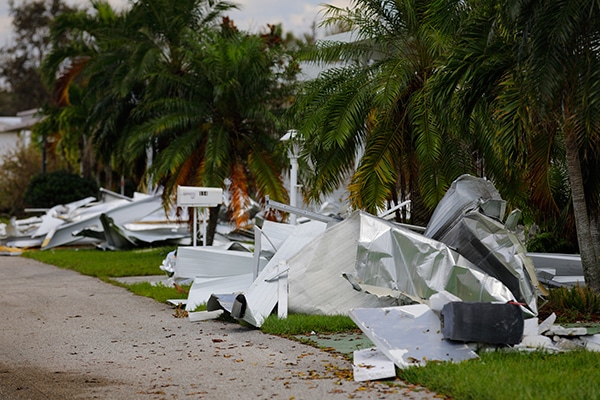 When Hurricane Michael hit the Florida Panhandle with 160-mile-per-hour winds last October, it caused billions of dollars of damage and left hundreds of people homeless and hopeless. Now recognized as the third most intense Atlantic hurricane to ever make landfall in the U.S., Michael has given us much to think about.
When Hurricane Michael hit the Florida Panhandle with 160-mile-per-hour winds last October, it caused billions of dollars of damage and left hundreds of people homeless and hopeless. Now recognized as the third most intense Atlantic hurricane to ever make landfall in the U.S., Michael has given us much to think about.
Although we aren’t expected to experience anything like Michael this year, it’s still well worth our time to reflect on lessons we can learn from last year’s storm. In this blog post, I’m going to suggest several takeaways from Hurricane Michael about personal safety, storm damage, and insurance claims.
As a Hurricane Approaches, Play It Safe and Go to a Shelter
Although the National Hurricane Center has very sophisticated technological tools for predicting and tracking hurricanes, the storms themselves are often unpredictable. Michael, for instance, strengthened as it approached the shore and intensified rapidly over land. As a result, many people who thought they could ride out the storm at home were seriously injured, with homes reduced to little more than rubble and debris.
What this suggests is that if you live in or near the path of a hurricane, you and your family should go to a shelter to wait out the storm. Michael showed us that even if you live in a home built within the past 30 years under Florida’s strengthened building code, you’re still not safe. The intense, sustained winds destroyed newer brick and wood homes and other buildings along with trailers, while falling trees and blowing debris caused even more damage.
As a Hurricane Intensifies, Consider Leaving the Area
Typically, fatalities from hurricanes occur because of flooding and storm surge in coastal areas. Consequently, traditional wisdom for emergency managers has been to evacuate coastal areas and recommend safety precautions for inland areas. Wind is a secondary consideration.
Unfortunately, Hurricane Michael revealed a fallacy in this kind of thinking. Three people who did not heed evacuation warnings died in the storm surge in Mexico Beach, where the storm made landfall. However, several more people died inland on the Florida Panhandle, where there had been no evacuation orders, because they were hit by falling trees and blowing debris. The lesson: high winds from hurricanes can kill too, so people who live inland might need to evacuate, along with the people from coastal areas.
Protect Your Property as Much as Possible
Many of the people whose homes were destroyed by Hurricane Michael were surprised by the power of the storm. Don’t be. Hurricanes are destroyers, and you need to be prepared. Your home might be sturdier than some of the structures in the Florida Panhandle that were destroyed by Hurricane Michael. However, many buildings throughout the state of Florida cannot withstand winds of the hurricane’s magnitude without sustaining some damage, so why take chances?
You are probably not going to rebuild your home to make it more storm-resistant, but there are several steps you can take to protect your property from wind damage before a hurricane hits. Experts suggest boarding up windows with storm shutters or plywood or installing impact-resistant windows to reduce the likelihood of shattering, securing all loose objects outdoors so they don’t blow around and damage your property, and trimming trees to prevent branches from blowing and causing damage. Unplugging appliances and electronic equipment is also suggested.
We also recommend creating a complete inventory of everything in your home. Take pictures of the contents of every room in your home. Include make, model, item and serial numbers for your appliances and electronics and appraisals and receipts for jewelry, art work, and antiques. Save your pictures in the cloud, and in case of damage, you won’t have to struggle to recall the details of the things you’ve lost.
Be Aware That Your Florida Homeowners’ Insurance May Not Cover All of the Damage
Sad to say, many Hurricane Michael survivors also learned that their property owners’ insurance and disaster-relief funding cannot be counted on to cover the cost of repairs or rebuilding. Ten months after the storm, many people are still living in transitional housing and lacking economic security.
According to the Florida Office of Insurance Regulation, of the 147,877 Hurricane Michael-related claims filed, only 85.3% have been paid; 20,081 claims were not paid; and 21,669 claims are still open. In short, thousands of homeowners, mobile homeowners, and commercial property owners have been denied payment or are still waiting for payment from their insurance companies.
The lesson here is that without strong representation from an experienced Florida hurricane damage attorney, your insurance company may not give you the amount you need to repair or replace your property. Be sure to get help with your insurance claim from an attorney with a record of success in helping clients fight for their rights.
Get Help from an Experienced Insurance Claim Attorney
If your insurance company is giving you problems or if a claim has been denied, underpaid, or delayed, it’s time to call an experienced insurance claim attorney. At Malik Law, we’ve helped clients collect hundreds of thousands of dollars from insurance companies. We are available 24/7 to help you get paid what you deserve.
Sources
Greg Allen. (2019 June 7). ‘Everyone would have left’: Putting lessons from Hurricane Michael to work. National Public Radio (NPR).
www.npr.org
Greg Allen. (2019 June 1). No move to tighten building codes as hurricane season starts in Florida. National Public Radio (NPR).
www.npr.org
